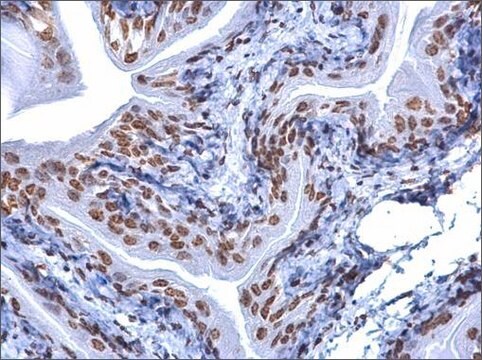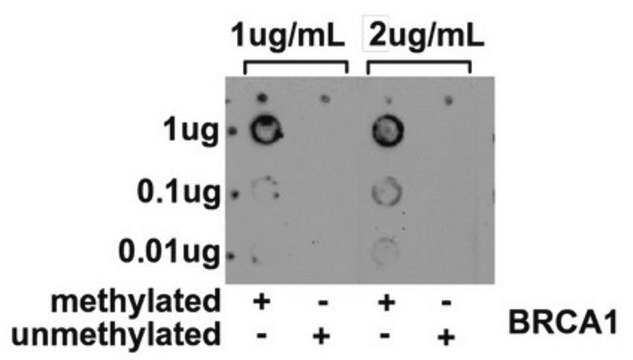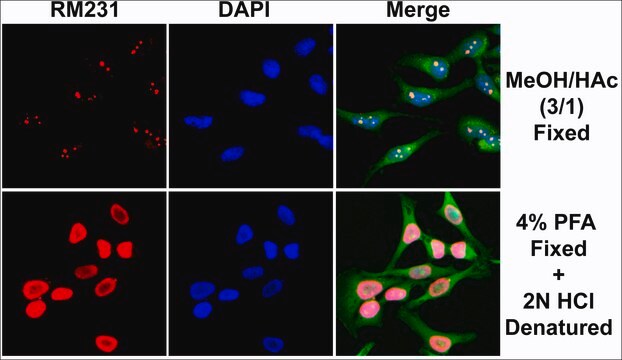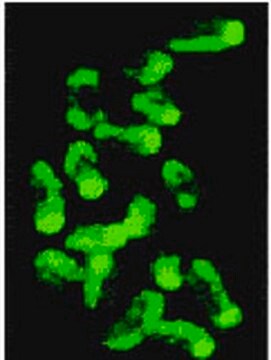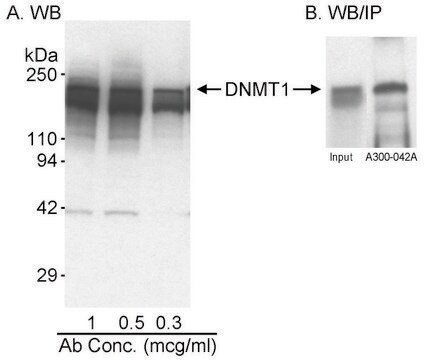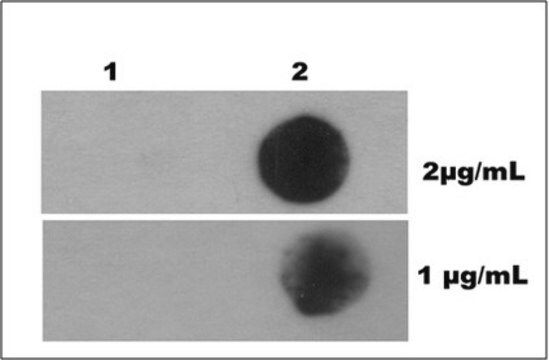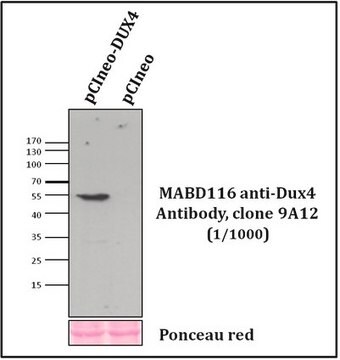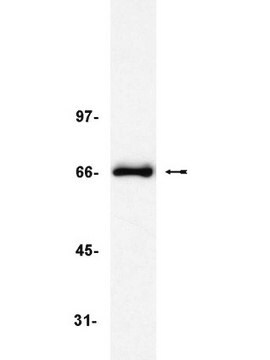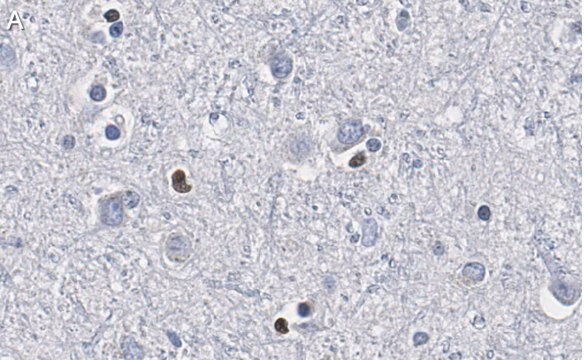MABE1081
Anti-5-Methylcytosine (5mC) Antibody, clone EDL MC-4
clone EDL MC-4, from mouse
Synonym(s):
5mC, 5-methylcytosine
Sign Into View Organizational & Contract Pricing
All Photos(3)
About This Item
UNSPSC Code:
12352203
eCl@ss:
32160702
Recommended Products
biological source
mouse
Quality Level
antibody form
purified immunoglobulin
antibody product type
primary antibodies
clone
EDL MC-4, monoclonal
species reactivity (predicted by homology)
all
technique(s)
dot blot: suitable
immunoprecipitation (IP): suitable
isotype
IgG2aλ
shipped in
ambient
target post-translational modification
unmodified
General description
Four types of cytosine modifications have been identified in mammalian DNA, namely 5-methylcytosine (5mC), 5-hydroxymethylcytosine (5hmC), 5-formylcytosine (5fC), and 5-carboxylcytosine (5caC). While 5mC, 5hmC, and 5fC occur in embryonic stem (ES) cells and many cell types in all the major organs (e.g. brain, heart, lung and kidney), 5caC has only been detected in a few cell types at a 10 times lower level than 5fC. The sequential oxidation of 5mC to 5hmC, 5fC, and 5caC catalyzed by the ten-eleven translocation (TET) enzymes has been proposed as a potential route for the demethylation of 5mC back to cytosine (C). Thymine DNA glycosylase (TDG), for example, can excise 5fC and 5caC from DNA as part of the base excision repair (BER) pathway to restore the C-nucleotide. Emerging evidences suggest that the different modifications may be selectively recognized by various proteins, and methyl-CpG-binding protein 2 (MeCP2) binding to 5hmC has been proposed as a means of epigenetic regulation in neurons. The conversion of 5hmC to 5fC, in turn, induces an enhanced binding of DNA-repair-associated proteins to 5fC, which has been proposed as a signal for DNA demethylation.
Specificity
Clone EDL MC-4 targets 5-methylcytosine (5mC), but not 5-hydroxymethylcytosine (5hmC), 5-carboxylcytosine (5caC), or unmodified cytosine (C). A less than 25% cross-reactivity toward 5-formylcytosine (5fC) was observed, which has no impact on 5mC detection by clone EDL MC-4 in cell samples, where 5mC modification level is typically more than 100- to 1,000-fold of 5fC modification level.
Target modification is not species-specific
Immunogen
BSA-conjugated 5-methylcytosine (5mC).
Application
Anti-5-Methylcytosine (5mC), clone EDL MC-4, Cat. No. MABE1081, is a highly specific mouse monoclonal antibody that targets DNA with 5-methylcytosine (5mC) modification and has been tested in Dot Blot and Immunoprecipitation.
Dot Blot Analysis: 0.5 µg/mL from a representative lot detected 0.39-100 ng of DNA with 5-methylcytosine (5mC) modification, but not DNA with only 5-hydroxymethylcytosine (5hmC) modification or unmodified cytosine (Courtesy of Jeong-Heon Lee, Ph.D.; Chad Clark; Tamas Ordog, M.D.; Zhiguo Zhang, Ph.D. Epigenomics Development Laboratory, Epigenomics Program, Center for Individualized Medicine, Mayo Clinic, Rochester, Minnesota, USA).
Immunoprecipitation Analysis: 2.5 µg from a representative lot immunoprecipitated 5 ng of DNA with 5-methylcytosine (5mC) modification, but not DNA with only 5-hydroxymethylcytosine (5hmC) modification or unmodified cytosine (Courtesy of Jeong-Heon Lee, Ph.D.; Chad Clark; Tamas Ordog, M.D.; Zhiguo Zhang, Ph.D. Epigenomics Development Laboratory, Epigenomics Program, Center for Individualized Medicine, Mayo Clinic, Rochester, Minnesota, USA).
Immunoprecipitation Analysis: 2.5 µg from a representative lot immunoprecipitated 5 ng of DNA with 5-methylcytosine (5mC) modification, but not DNA with only 5-hydroxymethylcytosine (5hmC) modification or unmodified cytosine (Courtesy of Jeong-Heon Lee, Ph.D.; Chad Clark; Tamas Ordog, M.D.; Zhiguo Zhang, Ph.D. Epigenomics Development Laboratory, Epigenomics Program, Center for Individualized Medicine, Mayo Clinic, Rochester, Minnesota, USA).
Research Category
Epigenetics & Nuclear Function
Epigenetics & Nuclear Function
Quality
Evaluated by Dot Blot analysis of DNA cytosine modifications.
Dot Blot Analysis: 2 µg/mL of this antibody detected 25-100 ng of DNA with 5-methylcytosine (5mC), exhibiting less than 25% cross-reactivity toward 5-formylcytosine (5fC) and no detectable immunoreactivity toward 5-hydroxymethylcytosine (5hmC), 5-carboxylcytosine (5caC), or unmodified cytosine.
Dot Blot Analysis: 2 µg/mL of this antibody detected 25-100 ng of DNA with 5-methylcytosine (5mC), exhibiting less than 25% cross-reactivity toward 5-formylcytosine (5fC) and no detectable immunoreactivity toward 5-hydroxymethylcytosine (5hmC), 5-carboxylcytosine (5caC), or unmodified cytosine.
Target description
Variable, depending on the size(s) of the DNA molecule(s) with 5-methylcytosine (5mC) modification.
Physical form
Format: Purified
Protein G purified.
Purified mouse IgG2a in buffer containing 0.1 M Tris-Glycine (pH 7.4), 150 mM NaCl with 0.05% sodium azide.
Storage and Stability
Stable for 1 year at 2-8°C from date of receipt.
Other Notes
Concentration: Please refer to lot specific datasheet.
Disclaimer
Unless otherwise stated in our catalog or other company documentation accompanying the product(s), our products are intended for research use only and are not to be used for any other purpose, which includes but is not limited to, unauthorized commercial uses, in vitro diagnostic uses, ex vivo or in vivo therapeutic uses or any type of consumption or application to humans or animals.
Not finding the right product?
Try our Product Selector Tool.
Storage Class Code
12 - Non Combustible Liquids
WGK
WGK 1
Flash Point(F)
Not applicable
Flash Point(C)
Not applicable
Certificates of Analysis (COA)
Search for Certificates of Analysis (COA) by entering the products Lot/Batch Number. Lot and Batch Numbers can be found on a product’s label following the words ‘Lot’ or ‘Batch’.
Already Own This Product?
Find documentation for the products that you have recently purchased in the Document Library.
Our team of scientists has experience in all areas of research including Life Science, Material Science, Chemical Synthesis, Chromatography, Analytical and many others.
Contact Technical Service